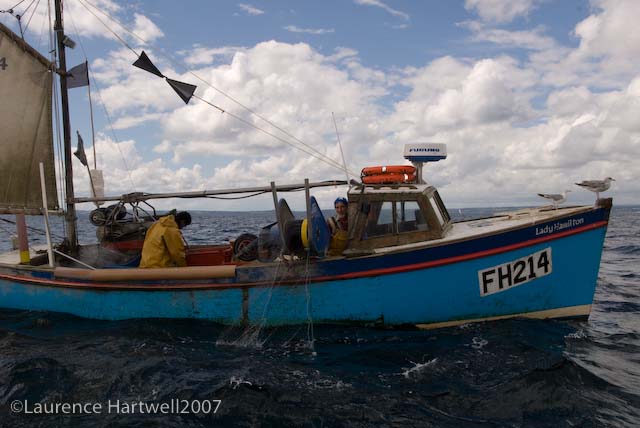Remember, the inshore fleet (under 10m vessels like the Lady Hamilton below) only have access to 4% of the TOTAL UK fish quota.
"A FISHERMAN has warned that Cornwall's iconic fishing boats face extinction due to new government and European Union red tape. The warning comes from fisherman Chris Bean, who has been forced to tie up his boat, the 8-metre Lady Hamilton, on the Helford River. He has been forced to pay a retainer to keep his crew but says he is unable to work, despite an abundance of fish in the sea. The Government has argued that quotas are essential to preserve fish stocks and ensure the long-term sustainability of the fishing industry.
 |
| Skipper/owner Chris Bean on the hauler of the Lady Hamilton off Falmouth. |
Mr Bean said his quota for cod stands at only 230kg a month, which his boat can catch in just two days. A total ban on catching sea bass later this month will also hit small boats across Cornwall and beyond, he warned. "This has led to a disastrous situation for the small boat fishermen around our coast," he said. "After all, it is them that provide the local communities with the buzz, the tradition, the jobs and seamanship skills that so much of the nation enjoys, expects and admires."
He said he would be unable to catch alternative fish without also netting cod, which he would be forced to discard. He added: "Unless immediate action is taken to support small vessels, they will absolutely disappear. "Only an overhaul of fishing opportunities with the reallocation of quota will prevent the demise of a once vibrant local inshore fleet."
Mr Bean, who has fished since 1969, said there was plenty of fish reported off the coast including a shoal off the east side of the Lizard peninsula which was the biggest he had seen since the Seventies. "There must have been hundreds of thousands of tons of mixed pelagic fish there," he said. "There were pilchards, mackerel, herring scads and sprats all making up the feed for the normal winter predators. "The last two or three years had been the best I can remember for bass and cod."
Mr Bean has built up his business in the past 10 years, supplying fish to high-end restaurants in London, across Cornwall and local farmers' markets such as the twice-weekly one in Truro. "Unless immediate action is taken to support small vessels, they will absolutely disappear," he added. "Only an overhaul of fishing opportunities with the reallocation of quota will prevent the demise of a once vibrant local inshore fleet."
Fisheries Minister George Eustice, MP for Redruth, Camborne and Hayle, said quotas were crucial to safeguard the long-term success of the fishing industry. He said: "Quotas play a crucial role in ensuring the sustainability of our stocks and it is important we strike the right balance between supporting all our fishermen and protecting the marine environment. "To help the inshore fleet, we took unused quota from the over 10-metre vessels and permanently transferred this to the under 10s, giving them an extra 678 tonnes in 2015. "This year, these vessels will also receive more than 1,000 tonnes of quota uplift to support smaller scale fishermen as they adapt to the discard ban, which came into force on 1 January 2016."
The EU Fisheries and Agriculture Council, after discussions with the UK Government, decided last month to a six-month closure of sea bass fisheries, to run from January to June.
Low-impact inshore fishing boats have a partial ban between February and March during spawning periods."
Courtesy of the West Briton. Follow @westbriton on Twitter